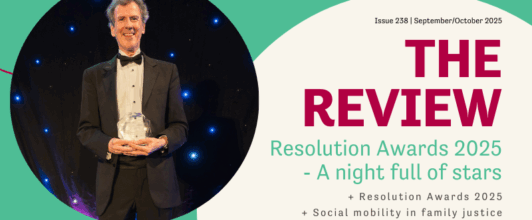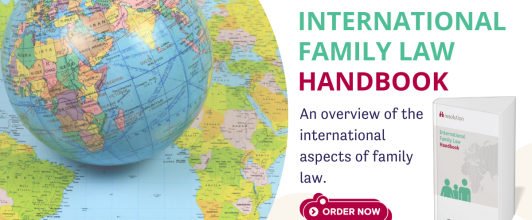
The Review
The Review is Resolution's bi-monthly magazine for members. Publishing six times a year with a mix of features, law and practice and news from the regions.
Broad range of information for professionals and practitioners in family law and justice.
Showing 81 - 100 of 518

The Review is Resolution's bi-monthly magazine for members. Publishing six times a year with a mix of features, law and practice and news from the regions.

Resonate is a new blog from Resolution, bringing together voices from across family law to share insight, experience and both personal and professional perspectives
As part of Resolution's Code of Practice members are asked to use the Good Practice Guides as part of their day to day work. These represent Resolution's core values and are designed to offer knowledge and guidance to our members.

Resolution Together is a way of working that allows lawyers to work with and advise couples jointly, including providing appropriate legal advice, through a divorce or separation.

Find resources on mediation, collaborative practice, arbitration and more.

This list of recommendations of family lawyers in other jurisdictions has been compiled by the members of Resolution's International Committee based on their working experience. The lawyers on this list are not Resolution members - unless indicated - and as such are not endorsed or recommended by Resolution.
Resolution is an organisation of 6,500 family lawyers and other family justice professionals in England and Wales, who believe in a constructive, non-confrontational approach to family law matters. Resolution also campaigns for better laws and better support for families and children undergoing family change.
Around 1,500 of our members currently offer family, children and/or family mediation legal aid services.
Pride = Protest
Pride = An antidote to Shame
Pride = Party
June is ‘Pride month’ in the UK, with London Pride taking place on 2 July 2022. What is the point of Pride? It’s changed overtime, as the rights and experiences of LGBT people have evolved. From Protest to a Party.
Make no mistake, Gay Pride in its infancy was all about Protest.
Resolution’s 6,500 members are family lawyers, mediators, collaborative practitioners, arbitrators and other family justice professionals, committed to a non-adversarial approach to family law and the resolution of family disputes.
This is Resolution's response to the Archbishops’ Families and Households Commission
Resolution is committed to creating and maintaining a friendly, safe and inclusive environment, regardless of age, gender reassignment, sexual orientation, race, language, political or other opinion, national or social origin, disability, physical appearance, religion or other status. We value the participation of each attendee and everyone involved in the event and want them to have an enjoyable and fulfilling experience. Accordingly, all attendees are expected to show respect and courtesy to other attendees and all participants throughout an event.
Listen to Resolution’s podcast, with guest experts discussing topical issues in Family Law, with our hosts Simon Blain and Anita Mehta.
This response has been prepared by members of Resolution’s Domestic Abuse, Children, and Legal Aid Committees, and Family Law Reform Group.
This is the The Resolution policy and procedure for members who wish to raise concerns about colleague members.
In this month's briefing for Legal Aid pracitioners we get an update on the Means Test Review, hear about a training event for practitioners who are new to CCMS, and we report on claims for translation costs that have been reduced on assessment by the LAA, plus much more.
This is a checklist of the main points a solicitor or direct access barrister should bear in mind when accepting instructions from a LiP. It begins with general issues and is then divided into sections according to the stage of the proceedings.
This is a checklist of the main points a solicitor or direct access barrister should bear in mind when accepting instructions from a LiP. It begins with general issues and is then divided into sections according to the stage of the proceedings.
Each month, Resolution pulls together all the latest news for legal aid practitioners. This is the January 2022 edition.
For every issue of The Review we will be publishing the articles here in the Knowledge and Resources section of our website as well as the pdf of the printed version.
2022 is coming. Let’s be optimistic. This plenary session, The Future of Family Practice, was an inspiring and informative discussion.
I was first attracted to this workshop by the line-up of speakers. It was hosted by Gillian Bishop (FLIP) along with Juliet Harvey (National Chair, Resolution), Claire Molyneux (Mills & Reeves), Annmarie Carvalho (The Carvalho Consultancy) and Elizabeth Rimmer (CEO LawCare).
With a busy life in practice, how many of us find the time to take in valuable insights from influential academic studies? When the opportunity to learn from Professor Debora Price presented itself, I was keen to see the knotty problem of pensions from a different perspective.
I had the pleasure of joining a talk with Ian Hawkins and Steven Hennessy on this topic and the first question I had was what exactly is a financial neutral?
The focus of this workshop was to explore some of the tricky issues which can occur in collaborative cases, brainstorm solutions, and consider how to get more cases using this method over the finish line.
The family law landscape is changing. The focus is now more than ever on working together to find a resolution. With the introduction of the HMCTS online platform making it easier for clients to complete their own divorce online and the implementation of no-fault divorce in April 2022, family law could see an increase in families trying to work through difficulties outside of the court arena, through out-of-court dispute resolution methods, and primarily through mediation.
In my mediation practice, from the very first meeting, I encourage separated parents to put the children’s needs first. We use a range of resources including, of course, the Resolution “Parenting through separation” guide. In particular I encourage them to consider attending a Separating Parents Information Programme (SPIP).
In E v L [2021] EWFC 60 Mostyn J provided helpful new insight into the application of historical company valuations in family financial proceedings. Here the accountancy SJE in the case reflects on what lessons can be learned.